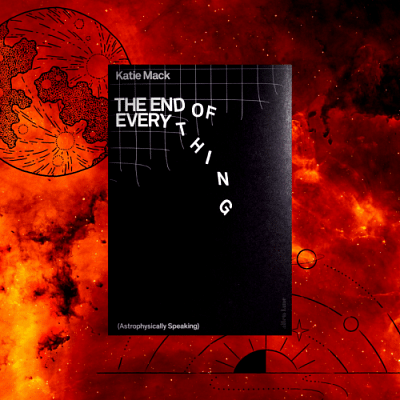There will be darkness again

As humans we teeter on the oddest of precipices. We are only animals: apes unusually adept at surviving Earth's harsh playbook for life. Like the multitude of organisms we share it with, we live, multiply, and without exception, we die. But along the way our pattern-seeking brains, so adept at faces and tell-tale signs of the wilderness, stumbled onto something that dwarfs all life on Earth, and then some. We saw the sun rise, and rise again; we saw the stars persist in their baffling nightly routes, and slowly began to piece together the wonderfully vast cosmos.
In her book The End of Everything (Astrophysically Speaking) (Penguin UK, August 2020), cosmologist Katie Mack ponders briefly on how we have grappled with our place in its seemingly timeless odyssey. Even as she begins with Robert Frost's harrowing prose: "Some say the world will end in fire, some say in ice…", her gaze extends far beyond the poet's horizons.
"Definitely fire." And the case is closed. The next step in our sun's journey is its red giant phase. The forecast for our tiny cosmic home is clear: molten hellscapes and oblivion. And as for the universe, there are no happily-ever-afters in sight.
Dr Mack studies cosmic evolution through "time" (a murky concept at such massive scales) and what we know of its beginning and end. The sheer grandeur of scope means the roles of cosmologists become highly specialised and vary greatly. There are theorists, experimentalists, and a gamut of creatures in between. As a phenomenologist, Mack sits somewhere near the middle, walking seamlessly between faculty doors and offering up a sweeping panorama from the cutting edge of science. It is as close as we will likely get to a cosmic truth.
As it stands, the data we have combined with our current physics leads to five likeliest possibilities. The smallest tweaks to how we interpret this data lead to vastly different endings: from a "cold and beautiful" heat death, to an ever-expanding bubble of annihilation that may be upon us next Sunday. I say "endings" quite literally. It is the one thing these disparate roads have in common.
Yet the book is somehow far from a morbid read, and quite beginner friendly. Much of science communication is the legerdemain of making highly technical concepts accessible without the only sensible way to describe them: mathematics. Many pop-science books, in an effort to dazzle (and thus sell) can succumb to the lure of taking poetic liberties with the science. Mack manages the gargantuan task of sticking the universe inside 200 pages without committing this cardinal sin, or without drowning us with esoterica. Deeply mathematical objects like symmetries and quantum field theories are described with refreshing clarity as she tightropes expertly across a field riddled with unknowns and open questions. As insignificant as our roles are in the universe's comings and goings, there is undeniable, inordinate joy in the privilege to understand some of it.
This joy permeates her entire book. What we get is not simply an appendix to the classics of the genre. Instead of Carl Sagan's transportive prose or Hawking's dense compendiums, we are offered a fresh new take on science communication. Many cosmologists grow desensitised to the initial shock value of what they study. But Mack lives comfortably with the vertigo. Her style is personal and her voice shines through, scintillating in snarky footnotes and curious tangents that suffuse the entire experience with the familiarity of your favourite professor on a passionate rant. You take the sidecar on her freewheeling trip through the cosmos, with many pitstops. But these only add to the wonder, and you cannot but be transfixed.
Most cosmologists would not fancy themselves philosophers, but it is an inescapable consequence of their work to inspire art and philosophy. (If any of you've loved Hozier's song "No Plan" but paused confusedly at the lines, "As Mack explained, there will be darkness again", it's our friendly neighbourhood cosmologist making a cameo.) Even as it veers into abstraction and far beyond our discernible realities, the first urge to delve into cosmology comes from the same itch that drove Frost to poetry and Van Gogh to his starscapes. So sometimes, cosmologists do sit down and talk about what it all means.
This is what makes the epilogue shine. The day is done, measurements made, and we are flies on the wall. They muse about what it means to be so little in this indifferent vastness, if legacy has a place in it, and what endures beyond destruction. What does one do in the face of unwavering oblivion, when we do not get to keep any of the things we've worked so hard to learn? Well, cosmologist Renee Hložek puts it best: "The whole point is that you understand it, and then you enjoy it, and then... 'so long and thanks for all the fish.'"
Shadman Iqbal studies Mathematical Physics at the University of Melbourne. Email: [email protected].

 For all latest news, follow The Daily Star's Google News channel.
For all latest news, follow The Daily Star's Google News channel. 



Comments